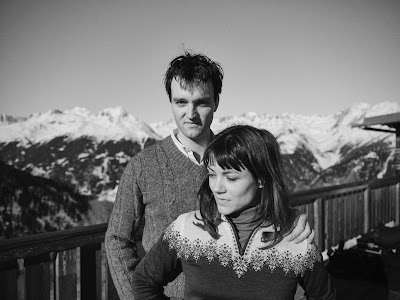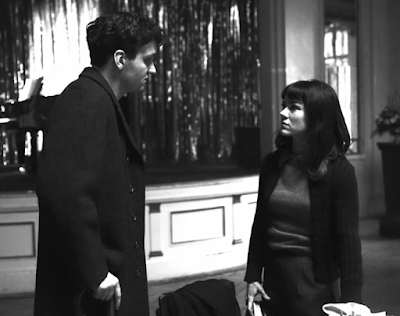The year of 1962. A physics congress in the Alps. An Iranian guest. A mysterious pianist. A bizarre cloud formation in the sky and a booming mystery under the mountain. THE THEORY OF EVERYTHING. A quantum mechanical thriller in black and white.
Timm Kröger’s The Universal Theory is a visually striking and genre-bending film that merges the cinematic sensibilities of the past with modern storytelling. In a fusion of science fiction and film noir, Kröger explores the multiverse, a concept that has gripped contemporary culture. However, Kröger’s approach is less concerned with the mechanics of multiverse theory and more focused on the film’s visual and narrative style, drawing viewers into a surreal experience.
The result is a film that captivates with its atmosphere but can leave audiences feeling detached by the end. Kröger’s blend of aesthetics both enhances the film’s unique tone and muddles its narrative clarity, creating a viewing experience that is equal parts intriguing and perplexing.
The film opens in 1974, where we are introduced to a German television show discussing a controversial book titled The Theory of Everything. The book, central to the plot, delves into the concept of the multiverse—a theory that posits the existence of countless parallel worlds, each representing different outcomes of life’s decisions. The public, however, dismisses the book as mere fiction, ridiculing its claims of being based on reality.
Following this setup, the narrative jumps back twelve years, shifting from colour to an arresting monochrome palette. We are introduced to Johannes (played by Jan Bülow), a young scientist under the mentorship of the rigid Dr. Strathen (Hanns Zischler). Johannes is attending a scientific retreat in the Alps, where the story takes a dramatic turn. The retreat’s main event, a conference led by an Iranian physicist, is unexpectedly cancelled when the physicist fails to arrive. While most of the attending scientists opt to enjoy the luxury hotel and its stunning alpine surroundings, Johannes remains fixated on his doctoral thesis, which revolves around formulating his own grand theory.
However, Johannes’ focus begins to waver as he becomes increasingly distracted by the enigmatic jazz pianist Karin (Olivia Ross) and the flamboyant Professor Blumberg (Gottfried Breitfuss). Both characters seem to be connected to the strange events unfolding at the retreat. Karin, in particular, draws Johannes’ attention, as she appears to possess knowledge about him that she shouldn’t have. As more physicists begin to mysteriously disappear or are found dead, Johannes is drawn deeper into a web of mysteries involving avalanches, bizarre cloud formations, brutal murders, and the possibility of a multiverse portal.
Kröger uses science fiction as the engine for these mysteries, while the noir elements help develop the story and characters. The film’s first act is particularly strong, laying the groundwork for an engaging and suspenseful narrative. It effectively builds intrigue, keeping the audience invested as the plot thickens. However, as the story progresses, the narrative becomes increasingly convoluted. Kröger’s ambition to connect every element of the plot sometimes overwhelms the film’s coherence, resulting in a jumble of ideas that can be difficult to follow.
Despite these narrative challenges, The Universal Theory tackles a range of profound themes, from obsession and alienation to post-war paranoia and existential anxiety. It also touches on the search for connection and the thin line between science and pseudoscience. However, the film’s deliberate pacing can make the experience feel sluggish at times, leaving the audience yearning for a more urgent push to move the plot forward. As more mysteries are introduced, the narrative becomes more complex, and the film risks frustrating the viewer rather than fully engaging them.
While The Universal Theory may not always hold together as tightly as it could, it delivers a fascinating blend of genres. The film is a noir-infused exploration of the multiverse, set against the breathtaking backdrop of the Swiss Alps. Even when the narrative falters, the film offers a visually compelling experience that keeps the viewer engaged.
The score, composed by newcomer Diego Ramos Rodríguez, contributes to the film’s nostalgic feel. His orchestral compositions evoke the grandeur of classic Hollywood cinema, though at times, the music can come across as overpowering. Nevertheless, the score successfully heightens the tension and emotional stakes of the story. Combined with Roland Stuprich’s stunning black-and-white cinematography, the film creates an immersive atmosphere that draws the viewer into its world. Stuprich’s use of Dutch angles and crisp monochrome imagery adds a noirish touch to the film, enhancing the eerie beauty of the snowy landscapes and the shadowy interiors of the hotel.
One of the inherent challenges of multiverse narratives is knowing how to bring them to a satisfying conclusion. In The Universal Theory, Kröger ties up the film’s loose ends, though not always neatly. His ability to create moments of cinematic brilliance is evident, particularly in a climactic scene filled with overwhelming sound and chaos—a sensory onslaught that mirrors an avalanche, threatening to bury both the characters and the audience under its weight.
While the film evokes a sense of classic cinema through its expressive cinematography and lush orchestral score, its measured pacing and somewhat rushed conclusion prevent it from fully realizing its potential. The story builds momentum, but it struggles to sustain it, leading to an ending that feels hurried and emotionally underwhelming.
In terms of performances, Jan Bülow delivers a competent portrayal of Johannes, but his character lacks the depth needed to make him truly engaging. Bülow’s performance doesn’t quite capture the subtle charisma required to fully invest the audience in Johannes’ journey, resulting in a somewhat pedestrian portrayal. Olivia Ross, as Karin, offers a more intriguing presence, though her character remains elusive until the film’s final act. Meanwhile, Breitfuss brings a lively energy to his role, providing some of the film’s more memorable moments.
The film’s Hitchcockian influences are apparent in its narrative style, particularly in the way it builds suspense and tension. The resort setting contributes to a sense of claustrophobia, with much of the action confined within its walls. Karin’s ambiguous role as a femme fatale adds to the film’s noirish atmosphere, leaving Johannes unsure whether she represents his salvation or his downfall.
The first act of The Universal Theory is relatively straightforward, but as the story delves deeper into abstract concepts, Kröger does an admirable job of keeping the audience on board. However, as the film becomes increasingly unmoored from the known laws of physics, it becomes harder to maintain that connection. The final act, in particular, lacks the emotional punch needed to leave a lasting impact.
The Universal Theory is a bold and ambitious film that captivates with its visual style and genre-blending narrative. While it may not always hit the mark, it offers a unique cinematic experience that pays homage to classic film traditions while exploring contemporary themes. Despite its flaws, Kröger’s film is an intriguing addition to the ever-evolving landscape of multiverse cinema.
The Universal Theory is one of 105 films screening as part of the Whānau Mārama New Zealand International Film Festival (NZIFF)
The full programme of 2024 films is outlined here.
Tickets can be booked online at www.nziff.co.nz







